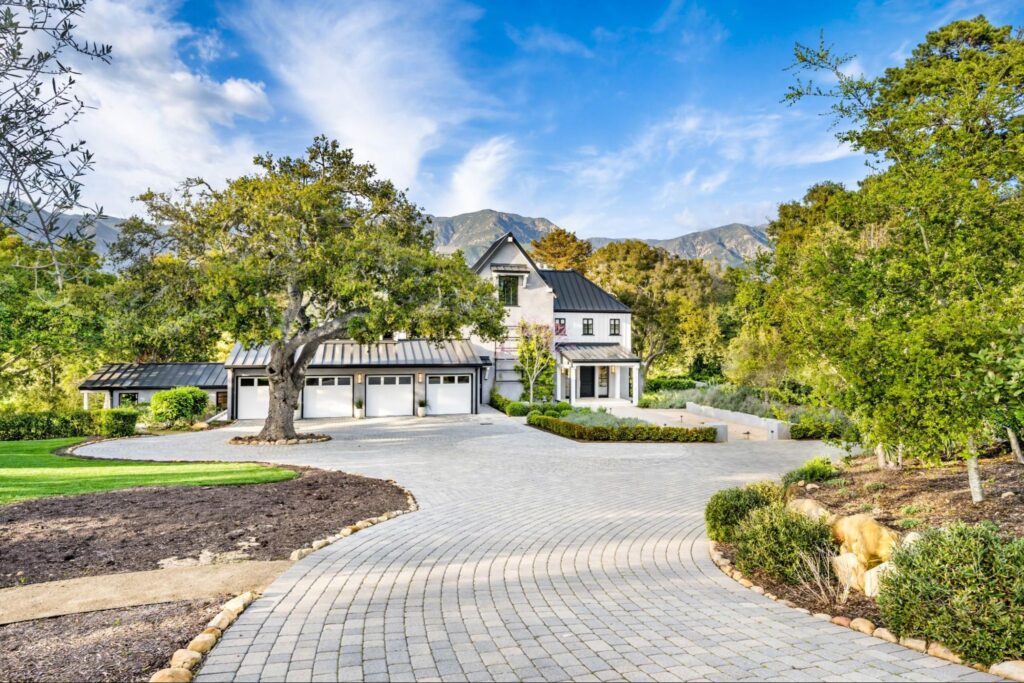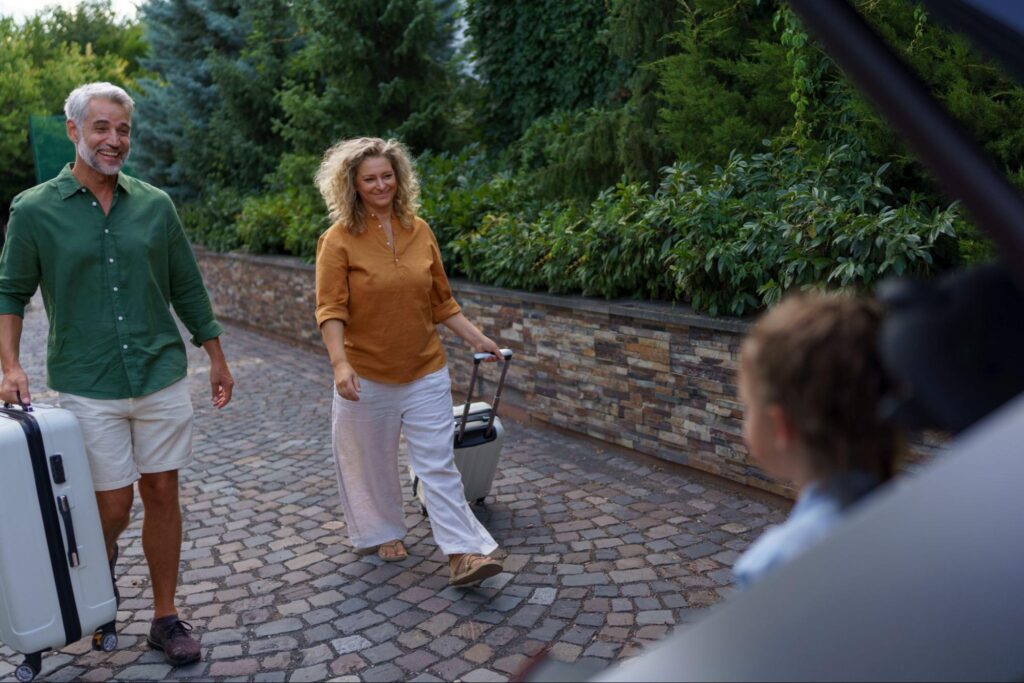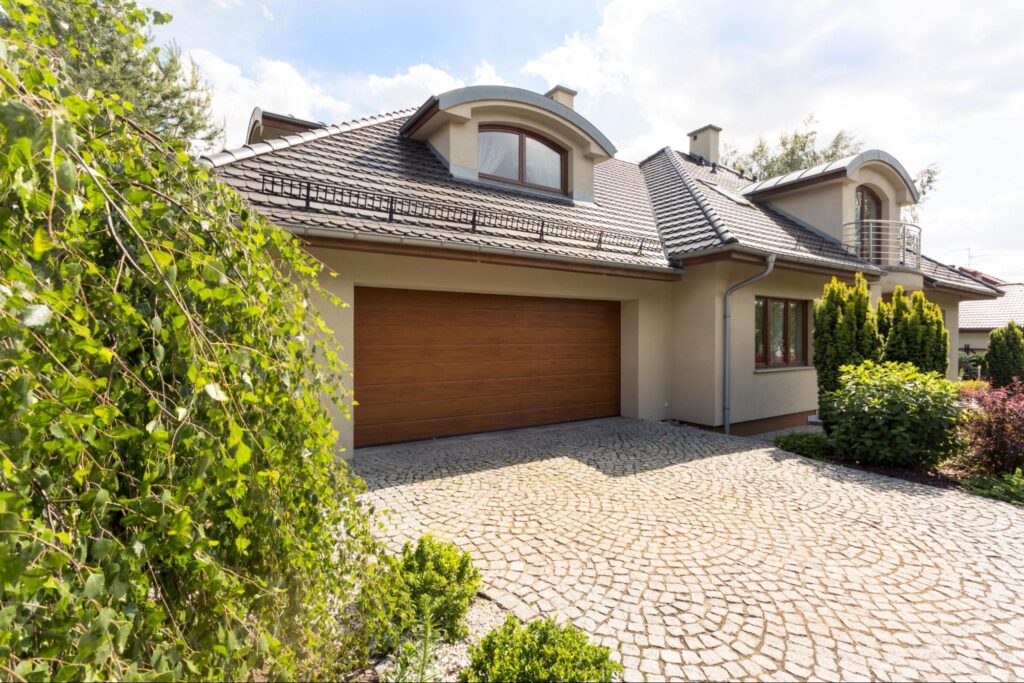
A driveway does more than guide cars to the garage. It sets the tone for the rest of the home. In 2025, homeowners are no longer settling for dull concrete or cracked asphalt. They want surfaces that last, look great, and work with their lifestyle. More of them are now turning to paver driveways for precisely those reasons.
The Building Blocks Behind Today’s Paver Driveways
Pavers are durable units made from concrete, brick, or stone. They’re installed piece by piece to form solid, interlocking surfaces. Unlike poured concrete or asphalt, they flex slightly, which helps prevent cracking. That makes them a wise choice for high-traffic areas, such as driveways.
How Paver Driveways Are Built and Laid
Pavers are typically molded, cut, or shaped into uniform sizes. They’re installed over a compact base layer and in sand or gravel. This method creates a surface that can shift slightly without damage. The individual units are fitted tightly together, building strength through interlocking pressure. This design also makes repairs much easier compared to poured surfaces.
Common Materials Used in Paver Driveways
Concrete pavers are the most widely used because of their flexibility and low cost. Brick pavers, made from fired clay, offer durability and timeless charm. Natural stone options, such as travertine, granite, and bluestone, have a high-end look. Each material has its texture, color tone, and performance qualities. Homeowners can choose what fits their style and climate needs.
Why Pavers Outperform Traditional Surfaces
Unlike solid slabs, pavers resist cracking from ground movement or temperature shifts. If one piece gets damaged, it can be replaced without tearing out the whole area. This modular system saves time and money on future repairs. Pavers also allow better drainage and reduce runoff. Combined with their wide design options, they’re the preferred surface for many driveways in 2025.
Why Paver Driveways Are Gaining Ground in 2025
Homeowners are making sharper choices about where they invest. A driveway isn’t just a path; it’s part of daily life and home value. That shift in thinking explains why paver driveways are pulling ahead. The reasons go well beyond looks.
Paver Driveways Boost Curb Appeal and Value
Homeowners care more about curb appeal than ever before because it’s the first thing visitors and buyers notice. Paver driveways provide homeowners with the opportunity to make a strong visual statement. Pavers add charm to driveways, helping properties stand out.
First Impressions Still Matter in 2025
Today’s buyers don’t just notice the house itself; they take in the whole property. A well-laid paver driveway offers symmetry, contrast, and visual warmth. It signals that the owner takes pride in their home. Concrete and asphalt can look drab, especially as they age. In contrast, pavers stay crisp, bright, and stylish through the seasons.
Design Options That Set Paver Driveways Apart
With pavers, design choices are more diverse than with flat slabs. Homeowners can choose from interlocking, herringbone, cobblestone, or basketweave styles. Each layout brings its texture and personality to the space. Beyond patterns, color options range from earthy tones to sleek grays. Pavers allow people to match their driveway with the home’s overall design without compromise.
Driveways Are Now Part of Outdoor Design
Outdoor living areas are getting more attention in 2025. People want driveways that blend seamlessly into the surrounding landscape. Pavers help unify front yards with patios, walkways, and garden beds. They also give the property a finished look that traditional materials lack. It’s a design upgrade that adds lasting appeal.

Paver Driveways Outlast Harsh Weather and Time
In 2025, weather events will be less predictable, and durability will be more critical. Driveways must withstand heat waves, heavy rains, and freezing winters. Paver driveways consistently outperform alternatives under these conditions. Their design makes them better suited for changing climates and long-term use.
Built to Withstand Harsh Conditions
Each paver is an individual unit, which allows for natural expansion and contraction. That makes them less likely to crack during freeze-thaw cycles. Concrete slabs, by contrast, often split under pressure or extreme temperature shifts. Pavers also handle heavy rainfall better. Water drains through the joints, preventing pooling or erosion.
Minimal Damage Over Time
A poured concrete or asphalt driveway will eventually crack, buckle, or develop potholes. Paver driveways resist that kind of damage because of their flexible structure. Even under pressure, the small gaps between pavers prevent large cracks from forming. When one unit does get damaged, it’s easy to replace. That convenience adds peace of mind for homeowners.
Paver Driveways Cut Maintenance Without Compromising Quality
Busy homeowners are tired of constant maintenance projects. They want home features that require minimal effort. Paver driveways fit that bill perfectly. They’re easier to manage, repair, and maintain.
Fewer Cracks, Less Hassle
Because pavers shift with the ground, they rarely crack like concrete slabs. This natural flexibility reduces the need for expensive repairs. Homeowners don’t have to deal with resurfacing or sealing year after year. Occasional sweeping and washing is enough to maintain their look. That low workload appeals to both younger families and aging homeowners alike.
Easy, Low-Cost Fixes for Paver Driveways
Fixing a concrete or asphalt driveway typically involves tearing out entire sections, which is both costly and time-consuming. With pavers, only the damaged pieces need to be replaced. Labor is minimal, and materials are inexpensive. This repair process saves homeowners money in both the short and long run.
Weed Control and Joint Sand Solutions
Some people worry that weeds will grow between pavers. However, polymeric sand helps seal those joints and block growth. Modern jointing compounds also resist ants and water washout. These advancements have made paver maintenance even easier in 2025. Occasional reapplication every few years keeps everything tight and tidy. It’s a small job that pays off in curb appeal.
Paver Driveways Support Today’s Eco-Friendly Living
Environmental responsibility is no longer a niche trend. It’s become a deciding factor in home upgrades. Paver driveways align with this shift by offering environmentally friendly features. They help homeowners lower their impact without sacrificing style or function.
Permeable Pavers Improve Water Drainage
Permeable pavers allow rainwater to filter through the surface, reducing runoff, lowering flood risks, and replenishing groundwater. Traditional concrete or asphalt can’t offer that benefit. These older materials send rain straight into the storm drain. By contrast, paver systems promote a healthier yard and surrounding environment.

Sustainable Materials Are in Demand
Many paver products are now made with recycled or local materials, which reduces manufacturing emissions and shipping costs. Heat-reflective finishes are also available, reducing surface temperatures. In urban areas, cooler driveways can even combat heat island effects. Homeowners feel good knowing their driveway choice helps the planet.
Long Lifespan Reduces Waste
Every time a concrete or asphalt driveway needs to be replaced, it contributes to landfill waste. Pavers, however, can last decades with proper care. Some manufacturers even reclaim and reuse old pavers. Their modular nature means nothing has to go to waste, supporting a circular economy mindset that’s growing in 2025.
Paver Driveways Offer Real Long-Term Value
The financial return on home improvements is always a concern. Paver driveways come with a higher upfront cost than asphalt. However, their lifespan, appeal, and lower upkeep make them worthwhile. Homeowners in 2025 see them as a long-term investment.
Adds Real Resale Value
Buyers often judge a home within seconds of arrival. A clean, attractive paver driveway improves that first impression. Real estate agents note that homes with pavers tend to sell faster and attract higher offers in many markets. The visual upgrade alone can be worth thousands during a sale.
Costs Less Over the Long Run
Traditional driveway materials may be cheaper to install. But they come with more long-term expenses. Resealing, repaving, and crack repairs add up quickly. Pavers initially cost more, but they save thousands over the years. That math is appealing to budget-conscious homeowners.
Insurance and HOA Benefits
Some homeowner associations favor paver driveways because they’re neater and safer. Smooth surfaces reduce trip hazards and flooding risks. That can lead to better insurance premiums or fewer citations. For those in strict communities, pavers are often the preferred option. They meet standards while offering style.
Paver Driveways Fit Modern Living Better Than Ever
Increasingly, homeowners are seeking materials that align with their lifestyle and values. They want less upkeep, better performance, and long-term gains. Paver driveways check all those boxes. They look good, last longer, and support modern living.
They Fit Modern Lifestyles
Families are busier, and retirees often don’t want to deal with upkeep. Pavers require less maintenance and last longer, which suits everyone. They efficiently handle children’s bikes, heavy SUVs, and harsh weather conditions. Years later, the same driveway still looks good. That reliability makes a difference in daily life.
A Strong Choice for Aging in Place
Older homeowners are planning to stay in their homes longer. Paver driveways support that with smooth, even surfaces. They’re less slippery and easier to walk across in any season. With lower maintenance needs, they reduce physical strain. That’s a strong selling point for aging households.
Outdoor Projects Are More Connected
People no longer treat driveways as separate from the yard. Outdoor design will be more connected in 2025. Pavers can match or complement walkways, patios, and entry steps. That visual flow gives the property a clean, cohesive look, and homeowners appreciate the flexibility it offers.
Turn Curb Appeal Into Value With a Paver Driveway
A driveway that looks sharp and lasts for decades isn’t out of reach; it’s a decision away. Pavers offer more than a surface; they bring peace of mind, pride in your property, and real value. If you’re tired of cracking, patching, or settling for less, it’s time to choose better. A paver driveway isn’t just an upgrade—it’s the right move.
Explore the Summit Home Improvements blog to get inspired, stay informed, and confidently plan your next project.